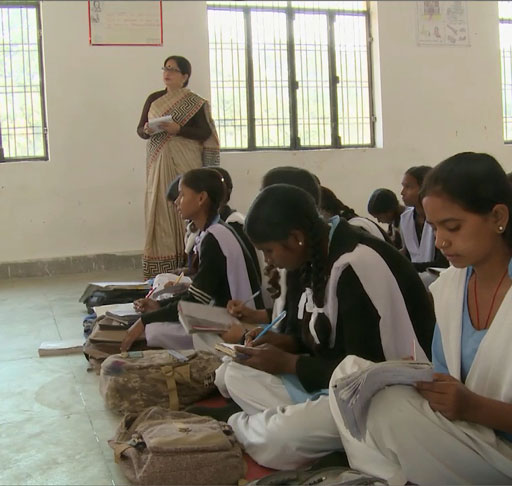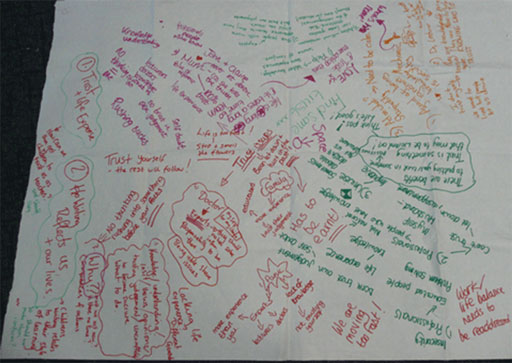5 Sustaining a participatory approach
Whether you used the suggestion in Activity 4 or devised an alternative for your teachers, you need to monitor what is going on and evaluate whether your focus project is developing according to plan (Stage 5 in Figure 2). Such monitoring and evaluation activities can also inform what to do next and allow you to identify good practice or refine and adapt your plans.
You might well take on a coaching role with some teachers, or you may delegate this task to others who could do so. (There is another leadership unit on mentoring and coaching if you want to refresh your knowledge about this approach.)
Case Study 2: Mrs Chadha’s monitoring and evaluation
I was very curious to know how the teachers would go about developing their practice and use the TESS-India OERs. I encouraged the teachers to talk to me and others about their experiences, which gave me some insights into how things were going. Whenever I walk around the school now, I try to listen to what is being talked about, and who is talking in the classrooms.

Over the weeks, I had noticed that Ms Chakrakodi’s classroom was subtly changing. She had already been using questioning to open the students’ minds, and was now working with another teacher to use the OERs to develop their practice, and they had told me this was going well. The subtle change was that she had developed a set of questions that made her students think about ‘what they knew’ and ‘why they were sure’.
I asked Ms Chakrakodi what had changed. She said that she was indeed trying to work on her questioning techniques in all her lessons. But she had noticed that thinking of good questions that would help her and the students assess what the students knew was hard to do in the midst of teaching. So she had started to write down possible questions before each lesson. Already she had established which sorts of questions worked best.
I made a note that at the next staff meeting that I would to ask Ms Chakrakodi and the others to share some of their best questions so that others could adopt them.
This case study shows how the school leader is not only monitoring what is going on, but ensuring that good practice is shared, encouraging more widespread adoption of new approaches. The next activity aims to help you keep the momentum going on your focus project.
Activity 5: Setting further tasks for your teachers
Start to think about your next staff meeting and how you could use it to review progress and set further tasks and goals for you and your teachers. Think about how you can prepare for the meeting so that you have maximum impact and teachers are not just talking to you.
You might ask teachers to work in pairs or small groups to discuss their experiences. Resource 6 has some questions you could use.
You could share your observations of good practice, taking care to share praise around. Teachers could be invited to share their success stories. You might even think about including feedback from students (anecdotal or through a survey).
Think about what teachers might do to further develop their skills with your teaching focus. What other support do they need? Are there other TESS-India OERs that might help? You should have some ideas ready, but listen to what they suggest and decide what to do next together.
Discussion
Your staff will be pleased to have their teaching recognised by you and other teachers. By holding a progress meeting you can recognise any positive changes, address any difficulties and keep your staff engaged. Enthusiastic and committed staff should be publicly praised. But remember that some staff will be more confident than others, so you should also praise small changes and offer additional support. Remember that you are modelling participative approaches where you value the exchange of ideas and experiences.
The next step is to consolidate good practice. In the next case study, school leader Mrs Chadha reflects on how she went about getting the changes established in her school.
Case Study 3: Using questioning to support learning becomes an everyday practice
Mrs Chadha was interviewed about how she embedded change in her school. Here she talks about the challenges that she faced and some of her strategies.
To be honest, I find embedding change the most challenging aspect of any project. It is so easy to tick it off and move on to the next project. I thought the only way to stop me from doing that was to write a plan for embedding the change, with dates for reviews, and to put it in my diary.
I was happy that all teachers had made some changes to their teaching, and I could hear more questioning taking place in the classroom to help learning. More varied questions were being asked and students were given more time to answer them. Some teachers were making major changes in many of their lessons; others did the occasional activity from an OER, often because they were prompted by their colleagues or by me.
I do not teach my own classes, but I was taking over the classes of the teachers who were going to observe each other. After a couple of these occasions I realised that they were also an opportunity for me to refresh my own teaching practice. As English is my teaching specialism, I asked a pair of English teachers whether I could join them in their task and they agreed. This made me realise how challenging the task was and how variable the teachers were in tackling it.
To keep up the momentum, I have now scheduled for the next two terms:
- monthly staff meetings to discuss progress
- times when the teachers can work together on planning for joint activities
- times when the teachers can go and observe each other (I am sure these will change, but at least there is a plan in place)
- a weekly ten- minute presentation by a teacher who talks about what they have been experimenting with.
I will continue to monitor progress.
With any change it is important to identify:
- and celebrate what has been learned
- what was challenging
- how the challenges were overcome
- what lessons were learned.
Activity 6: Celebrations and reflections

At the end of your term, you might organise a meeting to celebrate and acknowledge the hard work done on the focus issue in teaching and learning. In preparation for this you may want to go back to your Learning Diary and remind yourself of where you started. This meeting should not be a dry affair but should be interactive and participatory.
You could try using an ‘ideas wall’. This is a space on a wall where individuals can write ideas when they think of them, browse what others have written and add to others’ comments. It has the advantage of building over time and including everyone. To prompt teachers comments, you could for example put up large pieces of paper or pin small notes onto a board under the following titles:
- ‘What I have learned’
- ‘Changes in my teaching practice’
- ‘Changes in the learning behaviour of my students’
- ‘Changes in the learning outcomes of my students’
- ‘Challenges’
This should be a fun and invigorating activity, with staff standing rather than sitting, gathered around the ‘ideas wall’ (which might be a blackboard or large sheets of paper).
If you have a larger staff group, you could have different topics on different walls and ask staff to walk round and write their comments on the sheets of paper, and then discuss each sheet together. If you have Post-it notes, you could ask staff to write on them and then stick them on the appropriate sheet of paper. Another variation is to use paper tablecloths and ask staff to write on them as they sit in groups, moving from table to table.

As with any brainstorming activity, you need to be able to summarise it and draw it together acknowledging contributions. You could leave the displays up afterwards, or have them typed up for future reference.
Discussion
It is important to capture the successes of your term’s focus project. Doing so means that:
- progress is acknowledged by all
- individuals are recognised for their achievements.
This can be a fun activity that generates a feeling of wellbeing and collegiality rather than being a formal meeting. Ideally you will listen more than you will speak. You can then take what you have heard and use the information to plan how to enable more participatory teaching in your school.
4 Working with your teachers
